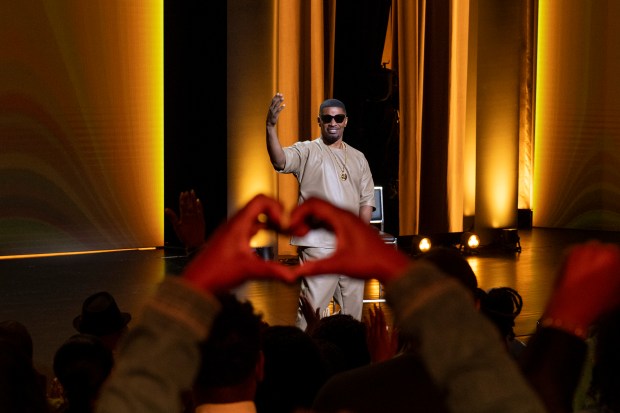It started with a bad headache in the spring of 2023. Then Jamie Foxx — the actor, comedian and musician — passed out. He remembers nothing from the three-week period that followed, which included brain surgery. He’d had a brain bleed that led to a stroke.
Almost nothing has been revealed about his condition until now. In his Netflix comedy special “Jamie Foxx: What Had Happened Was …” (taped at the Alliance Theatre in Atlanta), he recounts the experience from the inside, telling the harrowing personal story with some levity. It’s a confessional-style of performance that puts emotional honesty ahead of laughs, following in the footsteps of comedians such as Hannah Gadsby (“Nanette,” also on Netflix) and Jerrod Carmichael (HBO’s “Rothaniel”).
Most celebrities would launch their comeback after a major health event and prolonged absence from the public eye with an in-depth interview. Foxx, who outwardly appears to have recovered entirely, has chosen this path instead, which allows him total control. For nearly two years, an entire ecosystem of celebrity news fueled speculation about Foxx’s circumstances; it’s fair he would want to reassert some agency over how his story is told (and get a Netflix paycheck while he’s at it). But it is also why the special tends to feel so narrow in scope.
When daughter Corinne introduces Foxx, he’s greeted by rapturous cheers and a standing ovation. The subtext is clear: We’re so glad you’re alive and here with us today. Foxx is overcome (as he will be many times throughout the performance) and becomes visibly choked up by the response. In addition to Corrine, his guitar-playing teenage daughter Anelise joins him on stage, which is a nice touch. He’s clear that they, and his sister Deidra Dixon, were invaluable to his recovery.
An Oscar and Grammy winner, Foxx is the kind of talent whose presence always improves the work of those around him, and he has made it in a business where few reach such heights. Then it all came crashing down — “When you dream about what you want to be in life, you don’t dream tragedy” — and he couldn’t believe this was happening to him. Struggling to accept that he was unable to walk in the immediate aftermath, he thought: Strokes are for old people, not me.
That’s such a universal response — Why me? Why now? — but perhaps one that celebrity also exacerbates. He was angry for a long time. And then he talks about his conversations with God, as well as a healthcare worker named Holly at the rehab facility in Chicago who told him to knock off the arrogant celebrity crap: “The stroke doesn’t care who you are.”
If his emotions are still close to the surface, that’s understandable. “You have no idea how good it feels, Atlanta. I was fighting for my life, but I’m here in front of you.” He references internet rumors that Sean “Diddy” Combs had tried to kill him. “I know what you’re thinking: Did he?” Big laugh from the crowd. “Hell no, I left those parties early.” It’s the one line that has the structure of a joke, before he quickly returns to the subject at hand.
I kept wondering why Foxx avoided talking more deeply about the medical racism that possibly led to the first doctor he saw more or less dismissing his condition, or America’s health insurance industry (he likely had fewer worries paying for his treatment and extended hiatus from work than most) or the complexities of becoming newly disabled. He dwells on the shock of needing someone else to bathe him, and buried in that section is subtext around the realities of disability. The way it can change how you view yourself and your ideas about independence. I was hoping he might go further — who is he if he isn’t Jamie Foxx, the performer he was before the stroke? — but the special builds to a triumphant, almost tidy ending and perhaps his dark-of-the-night anxieties don’t fit into that framework.
This is still all so fresh, understandably. Maybe it’s too soon for Foxx to expand his material outside his own experience to offer broader, more nuanced insights. He’s always been a topnotch raconteur and his impressions remain bar none, conjuring everyone from Katt Williams to Denzel Washington to Wesley Snipes in “New Jack City.” He’s also showing incredible vulnerability here. When he struggles to keep his composure, you’re seeing a human being having a human moment beneath the polished entertainer that he is. “Wow, man, please lord let me get through this,” he says, steeling himself. I was moved by how moved he is.
Still, I couldn’t help thinking about someone such as actor James Van Der Beek, who was recently diagnosed with colorectal cancer and is selling memorabilia to help pay for his treatment. Sometimes celebrities are just like us, without the finances to weather a medical crisis. Musician Matthew Sweet recently had a stroke while on tour for a gig in Toronto and has been raising funds for his treatment on GoFundMe. In an update on his status, he noted: “The only way they would let me travel back to the States was with a medical crew, on an airplane and straight into a rehabilitation hospital. The cost of all these things was already astronomical. What is mankind doing? To not make these things available as part of our culture everywhere.”
Foxx doesn’t broach this topic. He’s here to tell his story and then draw a line under it, culminating with a celebration of his career highlights, as if giving himself a very public pep talk in front of a nurturing audience. He’s been through so much. He likely wondered what his life would look like going forward. It’s legitimately joyful to see him in good health. By all appearances, he intends to pick up where he left off, albeit with perhaps a few more Sundays spent in church.
“Jamie Foxx: What Had Happened Was …” — 2.5 stars (out of 4)
Where to watch: Netflix
Nina Metz is a Tribune critic.




